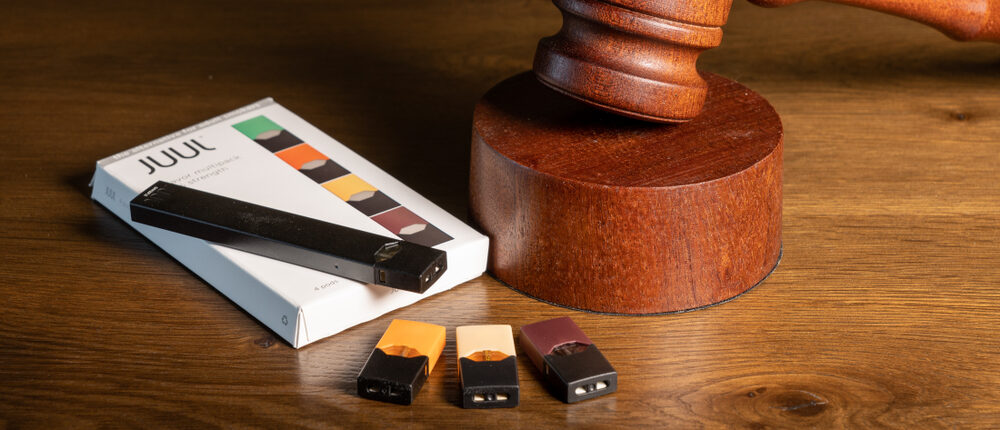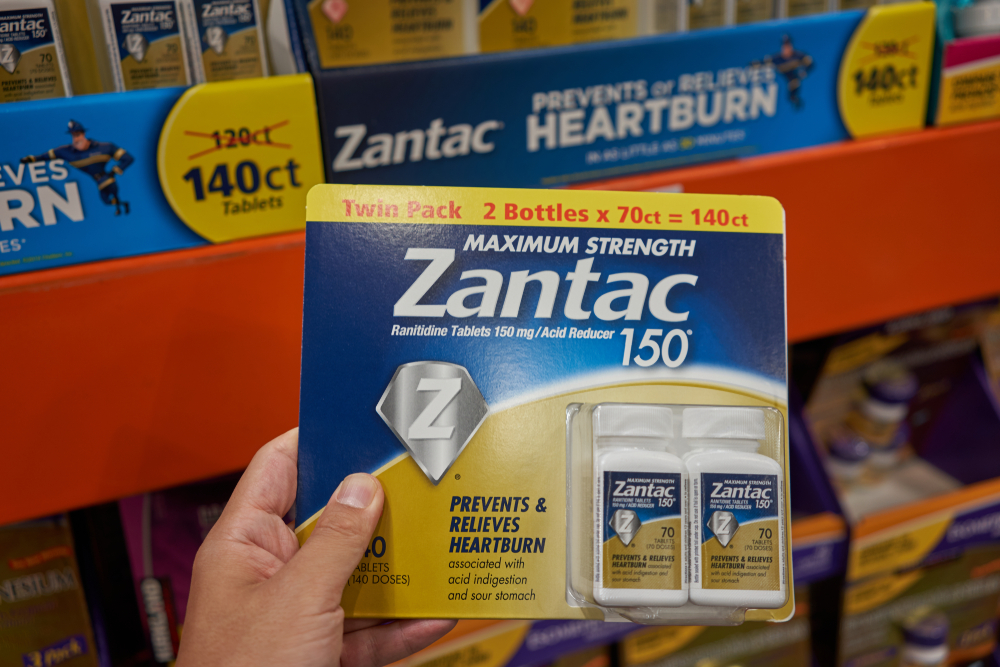Though their origins stretch back decades, electronic cigarettes (e-cigarettes) were introduced to the American consumer in 2006. They quickly became popular among adults and teens alike, with sales expanding by about 300% between 2016 and 2019 alone.
While they’ve been billed by some as a method for quitting smoking, there is an increasing body of evidence that suggests e-cigarettes may be nearly as harmful as traditional cigarettes. The marketing campaigns used to sell them have also come into question.
JUUL, the most popular brand of e-cigarettes, has been a particular focus of criticism for its ingredients and advertising methods. The company that manufactures JUUL e-cigarettes, JUUL Labs, is currently the subject of a multi-state investigation and soaring numbers of lawsuits, including class actions.
The company has recently altered some of its advertising and marketing, as well as reducing the number of products it offers, but for many people who used JUUL e-cigarettes, the damage has been done.
Every situation is unique, but for those who used JUUL products or have loved ones who did and were negatively affected by their e-cigarettes, it’s important to understand what rights you may have to pursue legal action to compensate you for the damages you suffered.
What Are JUUL E-Cigarettes?
JUUL Labs began its life as Silicon Valley startup Ploom in 2008. The company changed hands a couple of times before settling on the name JUUL in 2015, and not long after that, JUUL-brand e-cigarettes, commonly called vapes, became the most popular e-cigarettes in the United States. JUUL’s market share has fallen from a high of 75% to about 58%, though it’s certainly not the only player in the industry.
Let’s take a closer look at the history of e-cigarettes and JUUL’s meteoric rise to the top of the market.
History of E-Cigarettes & Vapes
Though they’re commonly referred to as vapes, e-cigarettes don’t produce vapor; rather, they produce an aerosol that users inhale and exhale. They also come in several forms, from sleek and futuristic disposable devices to larger battery-powered rigs that users refill with their vape blend of choice.
As long ago as the early part of the 20th century, inventors imagined new ways of smoking cigarettes. A patent granted in 1930 is believed to be the first known reference to an electronic cigarette device, though that product was never manufactured.
Another patent filed in the 1960s had a close resemblance to today’s e-cigarette, but the world’s first commercially viable e-cigarette was developed and sold in China in 2003. E-cigarettes came to Europe in 2006 and after some regulatory hurdles from the U.S. Food and Drug Administration (FDA), e-cigarettes had become the most widely used tobacco product among young people by 2014.
Despite their widespread availability, these products remain controversial and subject to additional scrutiny and regulation, both for their health impacts and advertising practices.
JUUL Brand
JUUL’s popularity dipped slightly over the course of 2019 and 2020, due to the legal and regulatory challenges the company is facing. But the brand remains the most popular type of e-cigarette in the U.S. market. By 2018, JUUL controlled 75% of e-cigarette sales in the U.S., though changes to its products and practices, combined with added competition and regulatory pressure, had caused the brand’s share to fall by 58% by late 2020.
Among young people, the use of JUUL products is so pervasive that many teens and young adults refer to vaping or using e-cigarettes as “juuling,” similarly to the way in which Google has become synonymous with searching the internet.
Vaping & E-Cigarette Use Among Young People
E-cigarette use is on the rise generally, with one analysis finding that sales increased by more than 120% between 2014 and 2020. But vaping is especially popular among teens and young adults.
Since 2014, e-cigarettes have been the nicotine product of choice among young people, and in 2019, according to the federal Centers for Disease Control and Prevention, more than one-quarter of high school students said they vaped. A 2018 Truth Initiative study found that 15- to 17-year-olds are about 16 times more likely to use JUUL e-cigarettes than those between 25 and 34.
JUUL Risks & Lawsuits
There are currently hundreds of lawsuits pending against JUUL Labs, with a major multijurisdictional litigation (MDL) established in the U.S. District Court’s Northern District of California. Additionally, all e-cigarette companies have had to contend with federal bans on certain types of products, while JUUL is facing an investigation by representatives from 39 states over its marketing and advertising claims.
The legal situation regarding JUUL and other e-cigarettes is evolving, so to be sure your case has the best possible chance, fill out our form to set up a consultation with a qualified attorney who’s an expert in handling these types of cases.
JUUL Legal Status
E-cigarettes and vapes fall into a category the FDA calls electronic nicotine delivery systems, or ENDS. E-cigarettes are legal in the U.S., and states have the authority to restrict their use in public as they can with traditional cigarettes.
But after a rash of cases of lung disease and even deaths related to vaping, the FDA banned some flavored vape liquids, namely those in pod-based e-cigarettes, such as JUUL. However, the company preemptively pulled flavors except for menthol and tobacco in 2019, so the impact of the FDA’s move is uncertain.
As mentioned already, JUUL has seen its sales decline, and it’s reasonable to assume the federal and company actions are major reasons for that drop.
Negative Health Effects of JUUL E-Cigarettes
For years, many e-cigarette manufacturers marketed their products as smoking-cessation aids, but because they all still contain nicotine, they have the potential to lead to addiction. This can create a host of other health problems with prolonged use.
Thanks to widespread public awareness campaigns, consumers have long known that smoking cigarettes can cause serious health problems, primarily lung cancer. According to the CDC, in a single year the agency’s anti-smoking campaign inspired almost 2 million Americans to kick the habit.
In fact, smoking has declined in U.S. adults, with most experts attributing the drop to public health campaigns. A 2018 analysis found that just under 14% of Americans were regular smokers; in the 1960s, that number was around 42%. These public health campaigns called attention to the terrible medical toll of smoking, including:
- Lung cancer
- Heart disease
- Stroke
- Emphysema
- Chronic obstructive pulmonary disease (COPD)
- Diabetes
- Low birth weight
While the health risks related to e-cigarettes are less well-established through decades of medical research, they are far from harmless. Because they include nicotine, much of the risk of heart disease related to cigarette smoking remains. On top of that, since vaping appeals heavily to young people, their brain development could be disturbed. Other potential health risks include:
- Increased cancer risk
- Physical injuries from burns
- Nicotine poisoning from vape liquid
- Low birth weight
- Gum disease
Exposure to nicotine is a particular danger for those who use JUULs. That’s because JUUL e-cigarettes contain far more nicotine than many other types of vapes — even more than regular cigarettes. One study from 2020 found that nicotine exposure was five to eight times higher in JUUL vapes than other tobacco products.
Before JUUL came onto the market, most e-cigarette liquids had a nicotine concentration in the range of 1% to 3%, while JUUL offered about 5% nicotine. That means a single 5% JUUL vape pod has about 40 milligrams of nicotine. The company also sells a 3% pod, which has about 23 mg of nicotine. For comparison, a pack of cigarettes contains between 22 mg and 36 mg of nicotine.
While the use of JUUL e-cigarettes has not been as definitively linked to cancer as smoking, there is increasing scientific evidence that though the risk may be lower than with traditional cigarettes, vaping still increases the risk of cancer.
JUUL Advertising & Marketing Practices
In addition to negative health effects, JUUL Labs has faced scrutiny over its advertising, marketing, and social media presence. In fact, the company faced so much pressure from regulators and others that it pulled TV, digital, and print advertising. However, as with the medical impact on those who consume its products, much of the damage has already been done.
The rapid rise of JUUL vapes in popularity was driven largely by the fact that its first offerings were flavored, including sweet options like mango and crème. Though those JUUL flavors aren’t sold anymore, it’s too late for the hundreds of thousands of teens and young people who have become addicted to e-cigarettes.
JUUL’s marketing and advertising practices are at the heart of many of the lawsuits the company faces. In fact, the company has already faced some repercussions over allegations that it attempted to market and sell its products to children and teenagers, particularly with flavors like those above that appeal more to underage individuals and non-smokers.
The company reached an agreement in 2019 after a lawsuit filed by the Center for Environmental Health, stating that could no longer advertise at events or concerts for those younger than 21, and that the company couldn’t use models in its ads who were younger than 28.
In 2020, authorities in Massachusetts brought a lawsuit saying the company’s early marketing efforts included purchasing ads on youth-oriented websites for Nickelodeon, Cartoon Network, and Seventeen magazine.
This issue, combined with the company’s early advertising that attempted to appeal to those trying to quit smoking, indicates the company may not have consumers’ best interests at heart.
Current Lawsuit Status
The major multijurisdictional litigation (MDL) that’s proceeding in federal court in California so far has absorbed 667 cases, including 539 personal injury claims and 92 cases brought by government entities, such as school districts, counties, and cities. These cases are currently before Judge William H. Orrick.
Another high-profile class-action lawsuit was filed in Florida by the parents of a girl who, at age 15, became addicted to JUUL e-cigarettes and later developed seizures after swallowing JUUL liquid.
To this point, no major financial settlements have been reached in any of the cases brought by individuals and families, though a major legal observer has indicated that pending litigation against JUUL bears some resemblance to state and federal suits against Big Tobacco, which ended in massive, sweeping financial settlements.
In addition to JUUL Labs, Altria/Philip Morris, which owns a share of JUUL Labs, has been named in lawsuits. Those who recall the tobacco company settlement of the 1990s will certainly know the name Philip Morris, though the company renamed itself The Altria Group in 2003.
What Should I Do if I Have Been Affected by JUUL E-Cigarettes?
First things first: Don’t continue to use the product or smoke traditional cigarettes as an alternative. Even vaping exposes your body to harmful substances, and using e-cigarettes is especially harmful to young people whose brains aren’t yet fully developed.
But if you or a loved one smoked JUUL e-cigarettes and became addicted to nicotine or suffered other negative health effects, it may be in your interest to consider your legal options. It also may be possible for those exposed to secondhand aerosols emitted by e-cigarettes to pursue legal action.
The most common negative health effects of vaping include heart disease, high blood pressure, heart attack, gum disease, brain damage, coughing, lung disease, and increased risk of cancer. Particularly regarding lung-related problems, those exposed to secondhand smoke may face similar issues.
If you have any of these issues and suspect they may be related to vaping or e-cigarettes, you should make an appointment to visit a doctor. The sooner you are diagnosed with any health problems, the more likely it is that you’ll be able to make a successful recovery.
How to Know if I Qualify to Be Part of a JUUL Lawsuit?
So far, many different types of individuals and even government bodies have filed lawsuits against JUUL Labs and Altria/Philip Morris, which owns about 35% of JUUL Labs. This includes people who used JUUL vapes, family members of those who did, schools, and even elected government officials.
If you have been negatively impacted in any way by JUUL e-cigarettes or the marketing practices that the company engaged in until very recently, you may be eligible to file a lawsuit against JUUL Labs and Altria/Philip Morris.
Lawsuits against the companies are fairly new, and so far, none of the suits filed by JUUL consumers have gone to trial. That means a settlement of these cases likely will be years away, if such an agreement is reached at all.
For those who have been negatively affected by JUUL, the best way to ensure you can receive compensation for the damage done to you is to fill out our form to receive a free evaluation of your claim and examine your next steps.
How Do JUUL Lawsuits Work?
So far, there has been one major multijurisdictional litigation (MDL) established in California that has consolidated hundreds of individual lawsuits against JUUL. In an MDL proceeding, courts group together cases that are filed by individual parties, consolidating them for the purposes of certain proceedings. This is done to speed up the trial process for cases in which specific facts may be similar, and the MDL path has become a popular method for hearing many cases involving product liability.
MDL cases differ from class-action lawsuits in that MDL cases allow for individual claims to proceed, while in a class action, all cases proceed as one. Thus far, there are hundreds of JUUL claims consolidated into an MDL in California, while at least one class action has been filed in Florida.
Because litigation against JUUL Labs is in its early phases, filing a lawsuit is the only way to seek compensation for your injuries.
Do I Need a Lawyer to Join a JUUL Lawsuit?
Currently, yes, it would be advisable for anybody who has been affected by JUUL’s products or marketing practices to consult with an attorney who can help ensure their case can be heard. To this point, no settlement has been considered since none of the cases in question have proceeded to trial. For this reason we recommend filling out our form and receiving a free claim review as the first step towards joining a JUUL lawsuit.
For that reason, it remains to be seen whether the hundreds of claims against JUUL will force the company to reach a mass settlement with consumers.
How Long Does It Take to Settle a JUUL E-Cigarette Lawsuit?
While cases are making their way through the court system, both the California MDL and Florida class action suits remain in their beginning phases. That’s why we can’t know yet how open the company will be to reaching settlements with those who were harmed by its products and questionable marketing practices.
If the history of tobacco-related litigation is relevant, it could be several years before legal action against JUUL is damaging enough to the company to force its leadership to settle claims. On the other hand, the company has faced legal and regulatory pressure in recent years and made changes to its products and marketing practices.
Not only that, but with profits and market share falling, quick settlements may be possible once a few plaintiffs have had their day in court.
What is the Statute of Limitations on JUUL E-Cigarette Lawsuits?
Every state has established a limited amount of time someone might have to file a lawsuit over a defective product, such as personal injury lawsuits over JUUL e-cigarettes. This varies from one year in Kentucky, Louisiana, and Tennessee, to 10 years in Rhode Island.
This case specifically may vary from that if the court decides to establish a date by which claims must be brought against JUUL, but that hasn’t yet happened. Still, that said, as with any legal case that may involve serious health problems, there is little time to waste.
How Much Can You Get from a JUUL Lawsuit?
None of the hundreds of cases so far against JUUL have gone to trial, which means none of the plaintiffs have received a settlement or court judgment. However, plaintiffs have sought financial compensation related to things like:
- Medical treatments and monitoring
- Diagnostic testing
- Nicotine-cessation programs
- Long-term medical care
- Compensation for pain and suffering
- Lost wages
- Punitive damages
How Long Does It Take to Get Your Money After You Settle a Lawsuit?
None of the hundreds of cases against JUUL Labs and Altria/Philip Morris, the tobacco giant that owns a 35% share, have proceeded to trial, judgement, or settlement, so we don’t yet know what the financial impact of these cases will be. We also don’t know how quickly those affected by the product will receive the funds to which they’re entitled.
However, in any legal case involving a financial settlement, both parties agree to a set of terms. These will include the timing of payment, whether given in a lump sum or over time. In general, though, once you’ve reached a settlement with a company like JUUL Labs, it will take a matter of just weeks or a few months to begin receiving payment.
Have Your JUUL E-Cigarette Case Reviewed for Free
Nicotine is a highly addictive substance, and if you or a loved one became addicted to JUUL e-cigarettes, which have more nicotine than most e-cigarettes, there is no shame in seeking legal assistance to ensure that you are compensated. That could mean receiving help with kicking the habit, along with getting financial compensation for any long-term or acute health problems you’ve experienced because of using JUUL e-cigarettes.
The best way to be sure that you get everything to which you’re entitled is to fill out our form to consult with an attorney who is an expert in cases like these and can provide a free evaluation of your case. Together, you can decide on your next steps.





